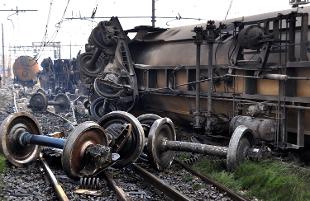Viareggio massacre, the families of the victims: "Sad and dark day for justice"
Viareggio massacre: manslaughter prescribed, Bis appeal
Viareggio massacre: pg Cassazione asks for a new trial for Moretti
Share
06 September 2021 "The affirmation of the Court of Appeal that the check on the correctness of maintenance would have avoided the accident because the absence of documentation concerning the maintenance history of the wagon and its components would have emerged is incensurable and therefore it would have been excluded from circulation ". This was written by the judges of the Court of Cassation in the 584 pages of motivation for the sentence of the trial on the Viareggio massacre that cost the lives of 32 people in June 2009.
The fourth criminal section of the Supreme Court, on 8 January last, had brought down against of the accused the aggravating circumstance relating to the violation of the rules on safety in the workplace and, for this reason,
the crime of manslaughter charged to the accused isbeen declared prescribed
. The second appeal process was ordered only for the charge relating to the culpable disaster. For Mauro Moretti, former CEO of FS and RFI, sentenced on appeal to 7 years, and Michele Mario Elia, former CEO of RFI sentenced in second instance to 6 years, the Supreme Court has ordered a new trial in which some profiles of guilt will be re-evaluated .
"The role of the railway company is anything but passive - write the judges of Piazza Cavour - it has rights to control the state of the wagon. The Court of Appeal has completely reasonably excluded that such controls could actually go to point of disassembling the components of the wagon and therefore also the wheelsets, but just as reasonably and indeed in line with the forecasts referred to here too, he considered that the control could be documentary. In the presence of the alarm condition determined by knowledge of breakage of the axles due to maintenance defects, this power was accompanied by the precautionary duty ".
Previous incidents were known
"The Court of Appeal pointed out that since before the Viareggio accident occurred, all operators in the railway sector were aware of the fact that maintenance not carried out in a workmanlike manner had been the cause of some railway accidents, caused by the fatigue breakage of salt on which they had settled - and had not been eliminated - corrosion and / or damage ", write the judges.
Moretti, even as a former CEO, had the power to control
The former CEO Mauro Moretti, "even after the termination of his office in Rfi spa, had had 'strong powers of control and direction over associated companies, including RFI itself' and therefore had maintained a power of influence, without however 'that the failure to exercise it was placed at the basis of the judgment of responsibility of Moretti as CEO of Rfi spa ", the judges continue, explaining that" once it has been held that Moretti has established or even only maintained that interpretative practice that has collected the complaints of the judges of merit it is not manifestly illogical nor contrary to the legal discipline to believe that such conduct has explained an effect on an event which occurred at a time when the office had ceased ".
"Prescription because the rule is later "
The reduction of speed to 60km / h when the tank train passed through the station was not a predictable rule when the Viareggio massacre occurred and was subsequently introduced as a rule. So in summary the Supreme Court in the motivation of the sentence on the disaster which, among other things, declared the crime of manslaughter due to the elimination of the aggravating circumstance of the violation of the rules on safety at work. The violation of the precautionary rule of speed reduction to 60 km / h "was identified ex post, with an erroneous identification of the conduct that would have avoided the event".
"The circumstance - the judges write - that after the accident, for trains pulling tank wagons, the reduction of the crossing speeds of the stations to 60km / h was ordered does not demonstrate the pre-existence of a similar rule, since it was not ascertained that this responded to a pre-existing orientation and indeed the merely precautionary nature of the measure was evident ". "The conduct that could have avoided the event" and which was ascertained after the accident, the judges still explain, was confused by the Florence Court of Appeal "with what the available knowledge should have suggested to operators in the sector before the occurrence of the accident ".

